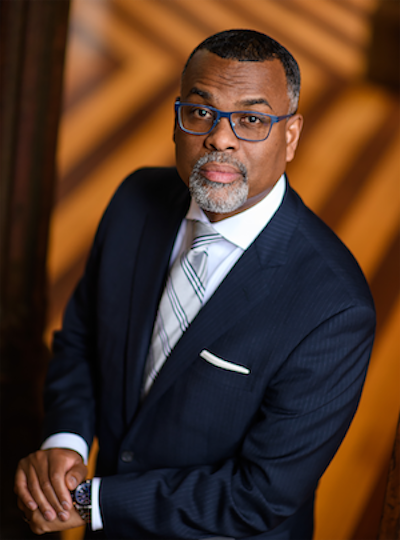We Live in a moment that is fraught. We live in a country that feels like it's in a cold civil war. Ugliness, the underbelly of American politics, is pretty much in clear view. The ghosts of the past haunt out in the open.

Eddie S. Glaude Jr. is an intellectual who speaks to the complex dynamics of the American experience. His most well-known books, Democracy in Black: How Race Still Enslaves the American Soul, and In a Shade of Blue: Pragmatism and the Politics of Black America, take a wide look at black communities, the difficulties of race in the United States, and the challenges our democracy face. He is an American critic in the tradition of James Baldwin and Ralph Waldo Emerson. In his writings, the country’s complexities, vulnerabilities and the opportunities for hope come into full view. Hope that is, in one of his favorite quotes from W.E.B Du Bois, “not hopeless, but a bit unhopeful.”
He is the James S. McDonnell Distinguished University Professor and chair of the Department of African American Studies, a program he first became involved with shaping as a doctoral candidate in Religion at Princeton. He is the former president of the American Academy of Religion. His books on religion and philosophy include An Uncommon Faith: A Pragmatic Approach to the Study of African American Religion, African American Religion: A Very Short Introduction and Exodus! Religion, Race and Nation in Early 19th Century Black America, which was awarded the Modern Language Association’s William Sanders Scarborough Book Prize. Glaude is also the author of two edited volumes, and many influential articles about religion for academic journals. He has also written for the likes of The New York Times and Time Magazine.
Known to be a convener of conversations and debates, Glaude takes care to engage fellow citizens of all ages and backgrounds – from young activists, to fellow academics, journalists and commentators, and followers on Twitter in dialogue about the direction of the nation. His scholarship and his sense of himself as a public intellectual are driven by a commitment to think carefully with others in public.
Glaude’s most recent book, Begin Again: James Baldwin’s America and Its Urgent Lessons for Our Own, was released on June 30, 2020. Of Baldwin, Glaude writes, “Baldwin’s writing does not bear witness to the glory of America. It reveals the country’s sins, and the illusion of innocence that blinds us to the reality of others. Baldwin’s vision requires a confrontation with our history (with slavery, Jim Crow segregation, with whiteness) to overcome its hold on us. Not to posit the greatness of America, but to establish the ground upon which to imagine the country anew.
Some like to describe Glaude as the quintessential Morehouse man, having left his home in Moss Point, Mississippi at age 16 to begin studies at the HBCU. He holds a master’s degree in African American Studies from Temple University, and a Ph.D. in Religion from Princeton University. He began his teaching career at Bowdoin College. In 2011, he delivered Harvard’s Du Bois lectures. In 2015 he was awarded an honorary doctorate from Colgate University, delivering commencement remarks titled, “Turning Our Backs” that was recognized by The New York Times as one of the best commencement speeches of the year. He is a columnist for Time Magazine and a MSNBC contributor on programs like Morning Joe, and Deadline Whitehouse with Nicolle Wallace. He also regularly appears on Meet the Press on Sundays. Glaude hosts the podcast AAS 21, recorded at Princeton University in Stanhope Hall, the African American Studies department’s home.
Top banner image credit: Sean Lee, Unsplash
Past Campbell Lectures

The Campbell Lecture Series is organized by the School of Humanities and Arts Dean’s Office, with generous support from the Campbell Foundation. The mission of the lecture series is to bring distinguished scholars in the arts, literature and humanities to Rice to discuss their work and career, while supporting engagement between scholar and student.

